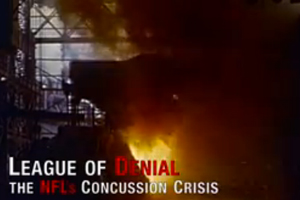PBS "Frontline" aired the scathing documentary "League of Denial" last evening revealing how the National Football League has addressed the troubling issue of chronic traumatic encephalopathy (CTE) among former players.
It was a textbook example of how the cover-up is always worse than the crime.
As early as 20 years ago, it was apparent the beating NFL players take, especially to their heads, was extracting a toll.
 But it wasn't until Pittsburgh Steeler center Mike Webster died that the first inkling of the profound damage done to the human brain became apparent.
But it wasn't until Pittsburgh Steeler center Mike Webster died that the first inkling of the profound damage done to the human brain became apparent.
Webster was a 17-year NFL veteran whose life came unraveled before he died at the age of 50. A videotaped interview with Webster shortly before his death clearly showed a man suffering from a severe cognitive disorder.
Additional research was done on the brains of other former pro players and in most all of them evidence of CTE was present.
The NFL's reaction? To at first deny there was any link between the brutal beating the brain takes during games and CTE. In fact, the NFL told players in a pamphlet there was little risk. Then-NFL commissioner Paul Tagliabue declared the CTE issue was the result "pack journalism."
When the CTE evidence mounted, the NFL began delaying, claiming it was studying the data produced by a group of doctors it appointed to study the issue - none of them neurologists - and would present conclusions at some future date. Current Commissioner Roger Goodell continues these delaying tactics to this day.
When players filed lawsuits claiming the league knew the risk and did not advise them, the NFL deployed a battalion of attorney's to defend the league in court.
Finally, when independent researchers persisted in presenting their alarming data to the news media, the NFL and its allies in the medical field defamed and discredited them.
The NFL passed up a wonderful opportunity to set present its side of the story when it refused to cooperate with the documentary's producers, no doubt on the advice of the aforementioned attorneys. It even told ESPN not to collaborate with PBS on the documentary (ESPN's parent, Disney, has billions staked on NFL broadcasts).
For an organization as PR savvy as the NFL, the documentary revealed a stunning tone deafness to a crisis that could well threaten the league's very existence.
The belated, piecemeal approach the NFL has taken to addressing player safety only serves to worsen the problem.



 Have a comment? Send it to
Have a comment? Send it to 
No comments have been submitted for this story yet.